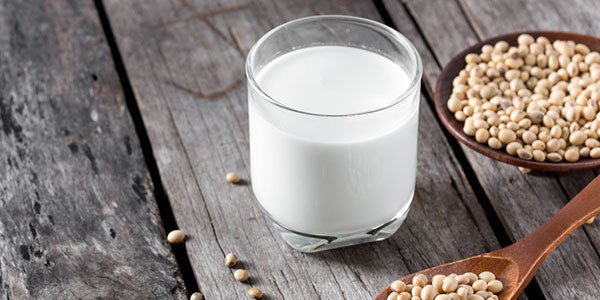
What Is Soy Milk?
As its name suggests, soy milk is produced from soybeans. Dried soybeans are soaked then ground into water and may be further fortified with nutrients (including calcium and vitamin D) and/or naturally flavored. Soy milk is found in most grocers, next to the other milks in the refrigerated section. Below depicts the nutrition of Silk® Soymilk, a common producer of plant-based milk.
Soy Milk Nutrition
Pros and Cons of Soy and Soy Milk
Cons: Bad news first!
Breast Cancer Risk
The claim of soy increasing cancer initially questioned its intake. Soy is suggested to mimic estrogen, the primary female hormone that is responsible for the development and maintenance of female characteristics. In a nutshell, high levels of estrogen are suggested to increase breast cancer risk. Confusingly, though, some research suggests soy may even lower the risk.
Male Infertility
Like breast cancer risk, men raised high concern after news claims suggested a link between male infertility and soy. Mostly in regards to sperm count, soy may create the risk of male infertility, or the difficulty of getting a female partner pregnant. Some studies have demonstrated that a diet rich in soy lowers sperm concentrations.
Insufficient Muscle Growth
Specifically, soy protein may not be the most effective post-workout supplement of choice. If choosing between soy and dairy milk, dairy takes precedency mostly related to its muscle-stimulating whey protein content.
Pros: Onto the good news!
Milk Alternative
For those with a dairy or nut allergy or lactose intolerance, soy milk is a valuable alternative for such individuals to enjoy. Additionally, soy milk matches the protein content of cow's milk with 8 grams, while being lower in carb content (9 grams compared to 12 grams found in dairy milk).
Plant-Based Protein
Individuals following a vegetarian or vegan lifestyle, or simply reducing animal products, are at an increased risk of consuming inadequate protein. Soy milk is an animal free, plant-based protein!
Heart Health
Soy milk may reduce heart-related conditions in more ways than one. Firstly, soy milk is naturally absent of cholesterol and saturated and trans fats; the trio supporting healthy lipid levels. Additionally, the U.S. Food and Drug Administration (FDA) suggests consuming 25 grams of soy protein daily may lower heart disease risk.
Bone Health
New research, published in the Federation of American Societies for Experimental Biology (FASEB), suggests childhood consumption of soy reduces the risk of bone degradation in later life stages. Additionally, the calcium and vitamin D found in fortified soy milk products is one bone-strengthening duo!
With such conflicting data and claims, you may still be confused on whether or not to reach for soy or soy milk, especially with such renowned pros and cons highlighted. But until more is known regarding its consequences on health, try to keep its intake in moderated servings and portions. Find more information on recommended soy intakes.
Reference:
Soy. American Institute for Cancer Research. Available at: http://www.aicr.org/foods-that-fight-cancer/soy.html.







